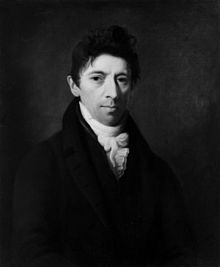John Thelwall
John Thelwall (27 July 1764 – 17 February 1834) was a radical British orator, writer, political reformer, journalist, poet, elocutionist and speech therapist.
[1] Thelwall was born in Covent Garden, London, but was descended from a Welsh family which had its seat at Plas y Ward, Denbighshire.
Young Thelwall also tried to make a living in an attorney office, but his morals and eccentricity made him quit the job and try to depend on his writing as a journalist and editor.
Jasmin Solomonescu argues that "Thelwall's medical training became compounded with his radical politics and developing theories of language and the imagination to provide a model and a lexicon for his vision of reform".
Considering the views of several well-known sources, Thelwall proposed that vitality or life was a combination of 'specific organisation' and 'proper stimuli'; blood is the means by which the 'stimuli' is conveyed to different parts of the body: 'I consider the blood independent of its nutritive power, as the specific medium by which the stimuli must be conveyed to the different parts of the organised frame, so as to produce the Vital Action.
This Blood in its passage through the Lungs, collects a something, which generates a specific heat....But what is this something, this vivifying principle?...Something that is contained in the atmosphere, something of a powerful and exquisitely subtile nature'.
[1] Through his correspondence and meetings with these poets Thelwall would forge a link between the Romantic movement in poetry and radical politics.
His career was very successful, and by 1818 he had earned enough money to buy a journal, The Champion, through which he called for parliamentary reform and in which he "denounced the government’s actions in the Peterloo massacre, and voiced scepticism about the Cato Street conspiracy".
A restoration project on Thelwall's grave in St Swithin's burial ground in Walcot, Bath was launched in 2006 by the Regional History Centre at University of the West of England (UWE).


